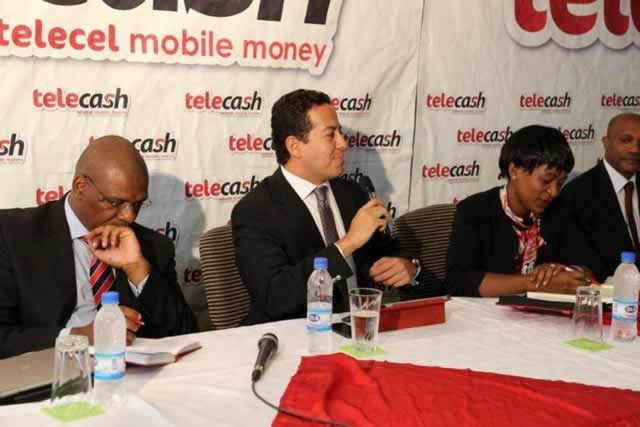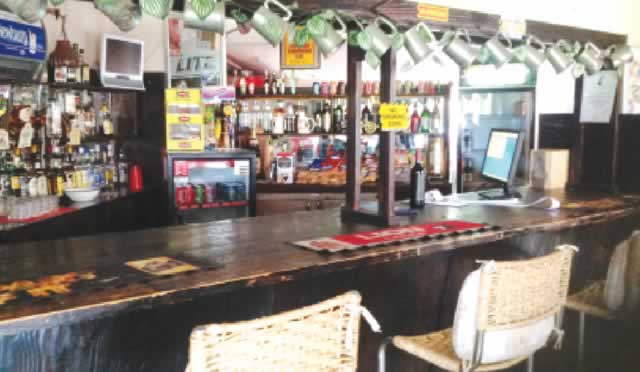Settle Ecocash, Telecash agent ‘wars’ urgently


Telecel Zimbabwe chief commercial officer Mr Ashraf El Guindy (centre) responds to questions during the launch of telecash last week flanked by the Mobile Financial Services director Mr Nkosinathi Ncube (left) and general manager Ms Angeline Vera
Manatsa Tagwireyi My Two Cents!
Recent press reports alluded to an Ecocash-Telecash agent “war” with the former being accused of blocking “its” agents from signing up as Telecash agents.
This is not the first tussle between the two mobile network operators nor is it the last. We are assured that as the cake shrinks even smaller, the two will inevitably find themselves stepping on each other’s toes again.
Econet’s actions are exactly the same as those employed by Safaricom Kenya, the proprietors of one of the fastest growing mobile money solutions in the world – MPESA. Competing mobile networks Airtel and Essar Kenya “Yu”, once lodged a complaint against dominant Safaricom, over agent exclusivity in Kenya.
The GSMA lists agent network as one of the most important constituencies in the success or lack thereof of mobile money deployments.
The role of agents in the mobile money business is of paramount importance as they make real the metaphor “your bank, in your pocket” or “your phone, your wallet”.
Agent ubiquity promotes convenient conversion of cash into e-money and e-money into cash, an uncompromisable feature in the mobile money business. Telecel are fully aware that without a big and well dispersed agent network, Telecash could follow in the paths of Skwama.
Econet’s arguments of exclusivity could be primarily based on a number of factors, namely, development of soft infrastructure.
It justifiably argues that it spent considerable amounts of money in customer education, agent education and training, risk, confidence building, agent network until now when the system has become universally embraced.
As such Telecash could not piggyback off Econet’s investment coupled with a tremendously shortened learning curve.
Imagine all the risks that come with a product launch, marketing and promotional campaigns, Econet had the guts to be the first mover, and as such feels it should not involuntarily be made to share the benefits accruing from its efforts.
Econet can further argue that, the company saw it strategically noble to invest in a complimentary institution a Bank – Steward Bank, to better push its mobile money agenda. The role of Steward Bank in the Ecocash business came to fore as early as November last year.
When some banks seemed to be struggling with liquidity and failing to pay customers on demand, Econet moved in to quell such fears through a promise of sufficient supply of cash from its ‘liquid’ Steward Bank to its agent network.
It stated that as part of agent support Steward bank was financially liquid to provide cash to needy agents in order for clients to access their monies through Ecocash.
Such commitment further strengthened customer confidence in the Ecocash system.
Therefore allowing its agents to also accept Telecash, is tantamount to investing for and on behalf of the competitor, surely Econet does not have enough control mechanisms to ensure that cash accessed from Steward Bank by its agents is encashed solely to Ecocash customers.
Ecocash and Telecash fees are structurally similar but differences emerge depending on the transfer band.
Thus Ecocash wouldn’t allow a competitor’s product, offering similar benefits to theirs to be accessed under the same shop.
They feared that their pricing shortcomings will be laid bare and most likely result in customer flight. Switching costs are almost zero if not non-existent in the mobile network industry.
On the other hand, Ecocash agents who feel prejudiced by this move have cited revenue opportunity lost through commissions.
Holistically looking at the unfolding events, Econet might seem to have taken this too far. Remember, not all Ecocash Agents are Econet shops, or franchise shops.
Had this restraint of trade act been imposed on Econet shops and franchise shops only, I doubt Telecel would have cried foul.
Most of these 4000 plus agents are or were existing businesses who hooked up to Ecocash so as to earn supplementary income, a few quickly come to mind, OK Zimbabwe supermarkets, TM supermarkets, Zimpost, Cellphone shops, grocery shops at growth points and rural areas, grinding mills in the midst of some rural village, tuck-shops etc. Infrastructure wise, Econet did not invest anything, but rode on the existing infrastructure, hence their only major argument continues to border around soft infrastructure only.
Recent adverts by Telecel, that they have signed up OK Zimbabwe, Bon Marche and Zimpost as agents of Telecash could point to some double standards on the part of Econet and an exertion of intimidation and lack of legal advice on contract negotiation on the part of smaller shop agents.
Many mobile money deployments in the developing world, namely Uganda, Kenya and Pakistan have been mandated to interoperate along with other service providers and agent exclusivity is prohibited.
My sister who is a nurse at Berejena Clinic in Masvingo, some 18km off the Masvingo-Beitbgridge highway confirmed that there is only one grocery shop, acting as an Econet agent.
From a regulatory perspective, does Econet really think that the regulator will let the entire community rely on only one service provider?
This will be tantamount to infringement of people’s freedom and right of choice. Assume Telecel and Netone are also accessible in the area and their customers wish to enjoy the wider spectrum of services offered by their mobile network providers – mobile money included, the foundations of regulation endeavour to promote this very right!.
If you look at this in the context of mobile money services being originally developed to cater for the unbanked, the financially excluded, regardless of Mobile Network Operator, Econet’s position ceases to hold water.
By ring fencing and protecting its Ecocash business, Econet is delaying the inevitable.
With more than 70 percent market share one would think that Econet should have been the one at the forefront of lowering charges to frustrate Telecash who still have development costs to contend with.
Econet can even go a step further and open the USSD platform so that funds can be transferred cross network.
Given its size, chances are very high that it stands to benefit through interoperability charges, even to banks, who have for long yearned for the opening of the networks.
While Telecel’s complaint is still pending at the RBZ, the writer feels that it is not only RBZ who could bring about a lasting solution to this issue.
POTRAZ, Competition and Tariff Commission, RBZ and the service providers (Mobile Network Operators), should be part to the solution.
Manatsa Tagwireyi is an Equities Dealer at FBC Securities. Feedback: [email protected]









Comments